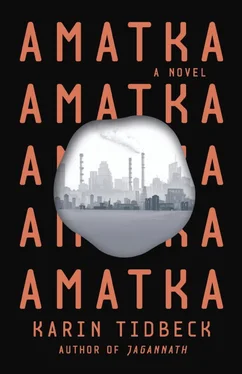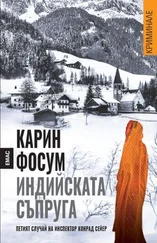Карин Тидбек - Amatka
Здесь есть возможность читать онлайн «Карин Тидбек - Amatka» весь текст электронной книги совершенно бесплатно (целиком полную версию без сокращений). В некоторых случаях можно слушать аудио, скачать через торрент в формате fb2 и присутствует краткое содержание. Город: New York, Год выпуска: 2017, ISBN: 2017, Издательство: Vintage Books, Жанр: Фантастика и фэнтези, на английском языке. Описание произведения, (предисловие) а так же отзывы посетителей доступны на портале библиотеки ЛибКат.
- Название:Amatka
- Автор:
- Издательство:Vintage Books
- Жанр:
- Год:2017
- Город:New York
- ISBN:978-1-101-97395-0
- Рейтинг книги:4 / 5. Голосов: 2
-
Избранное:Добавить в избранное
- Отзывы:
-
Ваша оценка:
- 80
- 1
- 2
- 3
- 4
- 5
Amatka: краткое содержание, описание и аннотация
Предлагаем к чтению аннотацию, описание, краткое содержание или предисловие (зависит от того, что написал сам автор книги «Amatka»). Если вы не нашли необходимую информацию о книге — напишите в комментариях, мы постараемся отыскать её.
Amatka — читать онлайн бесплатно полную книгу (весь текст) целиком
Ниже представлен текст книги, разбитый по страницам. Система сохранения места последней прочитанной страницы, позволяет с удобством читать онлайн бесплатно книгу «Amatka», без необходимости каждый раз заново искать на чём Вы остановились. Поставьте закладку, и сможете в любой момент перейти на страницу, на которой закончили чтение.
Интервал:
Закладка:
Karin Tidbeck
AMATKA

THE TRAIN
Brilars’ Vanja Essre Two, information assistant with the Essre Hygiene Specialists, was the only passenger on the auto train bound for Amatka. As soon as she had climbed the steps, the door shut behind her and the train jerked into motion. Vanja took a new grip on her satchel and typewriter case and pushed the suitcase through the sliding door with her feet. On the other side, the darkness was complete. She fumbled along the wall and found a circuit breaker next to the door. The light that flickered on was weak and yellow.
The narrow space of the passenger car was bare except for the brown vinyl bunk couches that lined the walls and the luggage racks, stacked with blankets and thin pillows, which were wide enough to sleep on, too. It was built for migration, for transporting pioneers to new frontiers, and its capacity was pointless here.
Vanja left her bags by the door and sat on each of the couches. They were all equally rigid and uncomfortable. The upholstery looked slippery but felt unpleasantly rough to the touch. She chose the couch at the far right-hand corner, where she’d be close to the common room and have a good view of the rest of the car. It was all vaguely reminiscent of the dormitory in Children’s House Two so long ago: the same vinyl mattresses under the sheets, the same lingering scent of bodies. But back then the room had been full of children and the sound of their voices.
She took a look at the tiny common room. The only window in the car was on the right wall, low and wide with rounded edges and a roll-down curtain. On closer inspection, the window turned out not to be an ordinary window, but a white screen that lit up at the press of a button. It was probably meant as a substitute for daylight. Under the screen, a table was bolted to the floor along with four chairs. One of the two high cabinets on the other side of the room held a tiny lavatory with a washbasin, the other a small pantry with preserves and fresh root vegetables. Everything was marked in large and comforting letters: WASHBASIN, PANTRY, TABLE. This area smelled vaguely of manure, either from the lavatory or from the containers that rode at the front of the train.
Vanja fetched her suitcase and undid the buckles. One of them looked like it was about to come loose. It had been a gift from someone, who had inherited it from someone else, and so on. In any case, it wasn’t going to last long: the word SUITCASE was almost illegible. She could fill in the letters, of course, but the question was what would happen first—that the bag simply fell apart from wear or that it dissolved when she put it away. She really ought to scrap it.
“Suitcase,” Vanja whispered, to keep it its shape just a little longer. “Suitcase, suitcase.”
She flipped the backrest to free up the lower bunk and made the bed with the set of sheets she’d brought. They too would soon need new marking.
The preserves in the pantry were apparently meant to be eaten cold. Vanja found a spoon and pulled the lid off one of the cans. According to the ingredient list, it contained “stew with a base of mycoprotein,” which meant a smooth, bland paste that stuck to the roof of her mouth. Vanja forced down half of the can’s contents and put it back in the pantry. The vegetables were fresh and tasted better. She cut a chunk of rutabaga into smaller pieces and slowly ate them one by one.
The train car swayed gently back and forth; a rhythmic pounding noise emerged through the floor, and though this must mean that the train was moving forward, it was impossible to tell at what speed. The window screen grew dim. Vanja looked at the clock on her wrist. The second indicator was stuck at one o’clock, twitching. She had forgotten to follow instructions; she should have left it at home or handed it in at the station. Looking at it while on the train was a bad idea. Unless they were made from fine matter, mechanical things sometimes didn’t behave like they should between the colonies. The train was safe, of course, but the little clock might not be. Vanja took it off and put it in her pocket.
She went back into the main car and changed into sleep clothes. They were getting too big for her, again. Her breasts dangled half-empty on her ribs; her belly no longer sagged from fat but from loose skin and flaccid musculature; her legs were no longer firm. She knew her face had thinned down in the same doughy manner, its warm bronze yellowed and fading into the shade of her dull eyes and hair in a nondescript spectrum of brown. She looked older than she was. Her supervisor, Illas’ Öydis, had treated her with exaggerated care. This is an important mission, she had said, so take all the time you need. No need to hurry. It was an important mission, carried out with the committee’s blessing. She was, after all, the first of her kind.
Vanja left the ceiling light on and huddled under the blanket. Everyone knew that there was nothing out there except the empty steppe: billowing grass, some hillocks, and combes. The lack of windows was just a security measure. She tried to give in to the rocking of the train. The corner should have felt safe, but it didn’t. The walls were too thin, a frail shell between her and the unseen landscape through which she was traveling.
THE FIRST WEEK
FIRSTDAY
Vanja watched from the doorway as the train pulled in to Amatka’s station, a simple block of concrete in the colony’s outer ring. The colony looked small compared to Essre, but its shape was familiar: the low gray cubes and rectangles of houses placed in concentric rings around the central building, the eight streets radiating from its center to the outer ring of domed plant houses. Beyond them, the yellowy gray of the endless tundra.
She heaved her suitcase down onto the platform, where it landed with a thud. She stepped off the train and shuddered. The air was raw, noticeably colder than in Essre. A group of workers waited on the platform to unload the two freight cars attached to the end of the train and load the pallets and sacks that stood in neat rows on the concrete.
A woman in blue overalls and jacket approached along the platform. Wisps of auburn hair curled out from under her black hat. She was maybe half a head taller than Vanja, possibly the same age as her, green-eyed.
“Welcome to Amatka. Ulltors’ Nina Four.” Her smile revealed a small gap between her front teeth.
Vanja took her outstretched hand. “Brilars’ Vanja Essre Two.”
A nauseating stink was spreading across the platform. The workers had begun to unload the large manure barrels from one of the freight cars.
Nina followed Vanja’s gaze. “It’s for the mushroom farms. You send us shit and get mushrooms back. Practical, isn’t it?” She chuckled.
“Oh. Yes.” Vanja cleared her throat.
Nina smiled. “Come on, let’s go. It’s not far.” She picked the suitcase up one-handed. “You’ll meet the others at home.”
Nina kept talking as they left the platform and walked toward the center of the colony. She was excited to have a lodger, she said; it was the first time her household had been drawn in the solidarity lottery. And since Amatka got so few visitors, it was a special occasion. Vanja refrained from impolitely asking how the household members would be compensated, but Nina told her anyway: they would be allowed time off.
“And it’s great that you gave such early notice,” she added. “This way we had time to get your room ready.”
Читать дальшеИнтервал:
Закладка:
Похожие книги на «Amatka»
Представляем Вашему вниманию похожие книги на «Amatka» списком для выбора. Мы отобрали схожую по названию и смыслу литературу в надежде предоставить читателям больше вариантов отыскать новые, интересные, ещё непрочитанные произведения.
Обсуждение, отзывы о книге «Amatka» и просто собственные мнения читателей. Оставьте ваши комментарии, напишите, что Вы думаете о произведении, его смысле или главных героях. Укажите что конкретно понравилось, а что нет, и почему Вы так считаете.












![Карин Тидбек - Аматка [ЛП]](/books/438406/karin-tidbek-amatka-lp-thumb.webp)